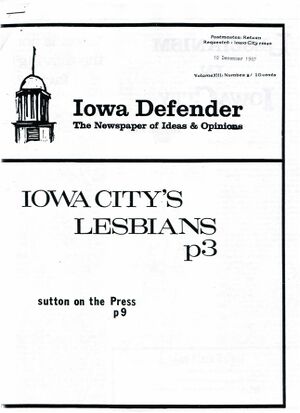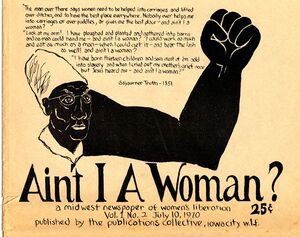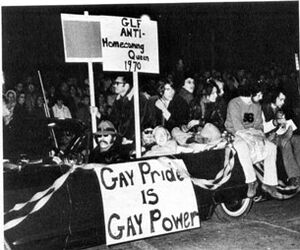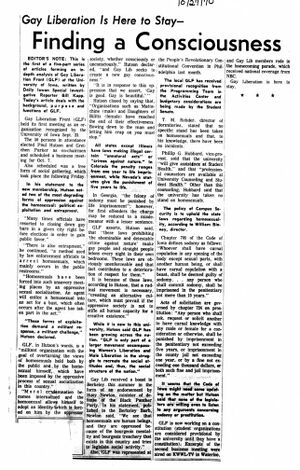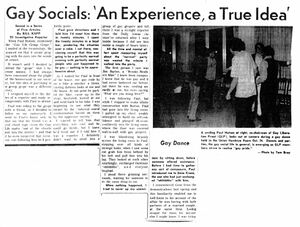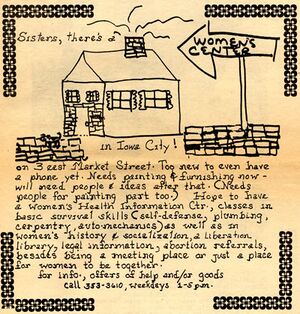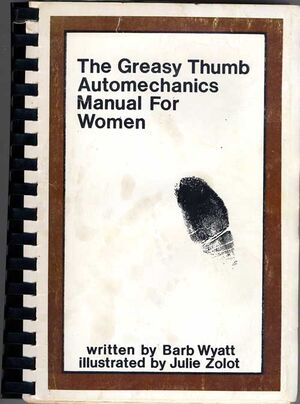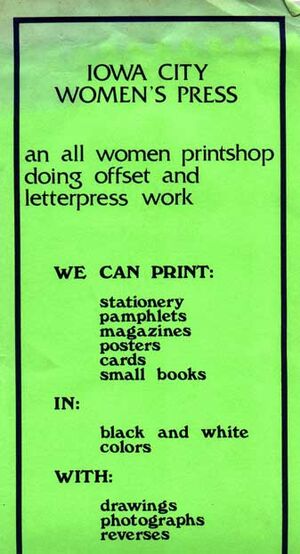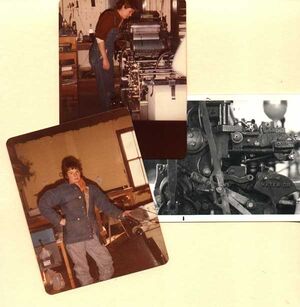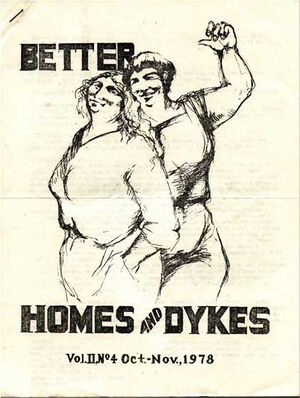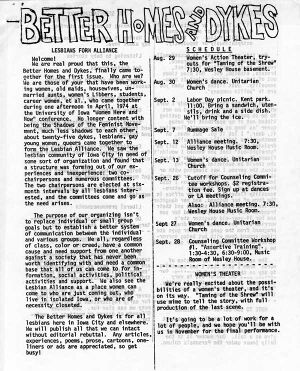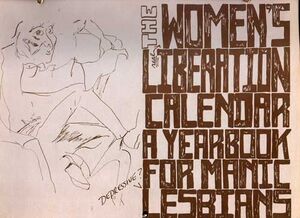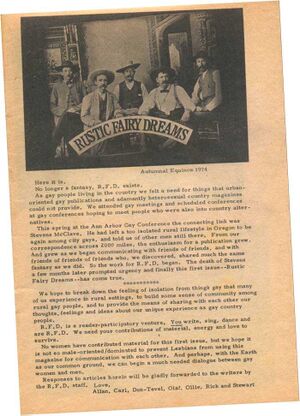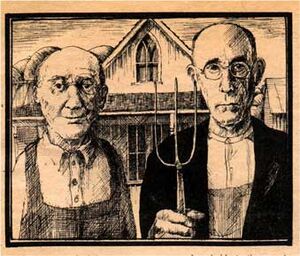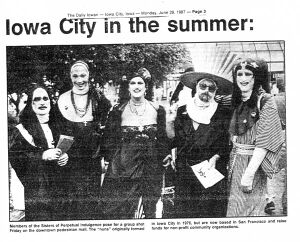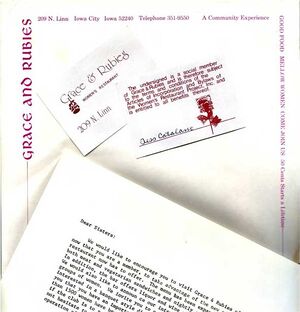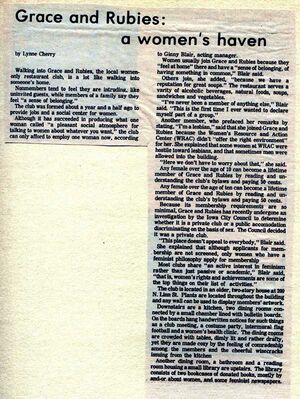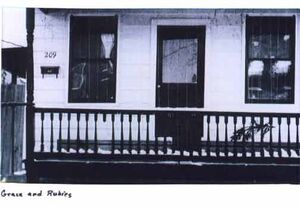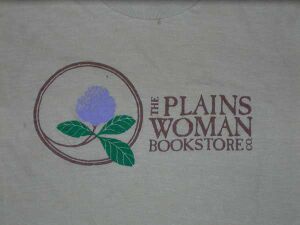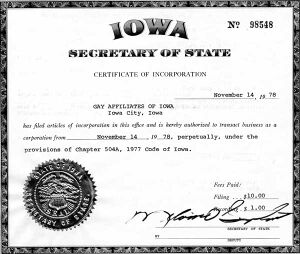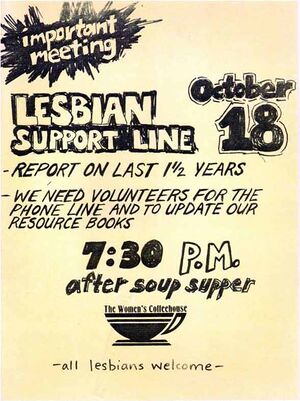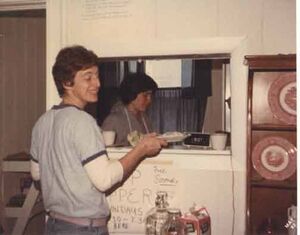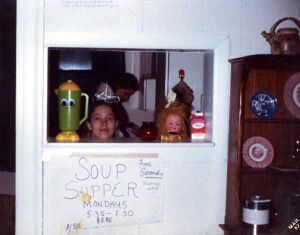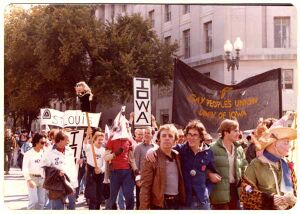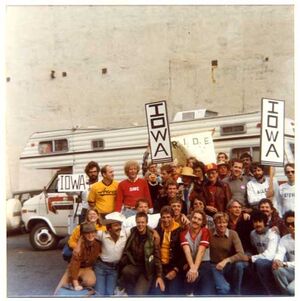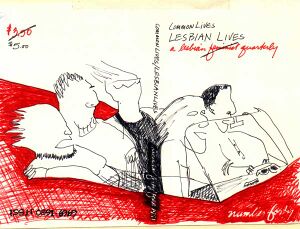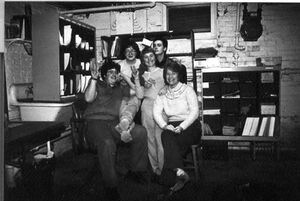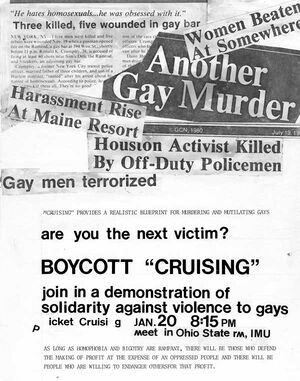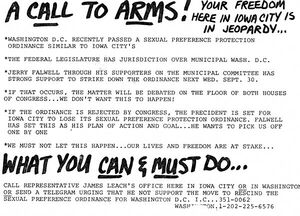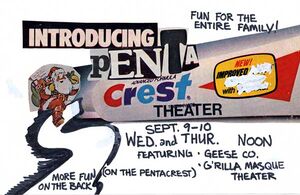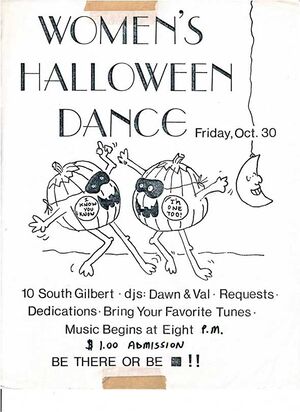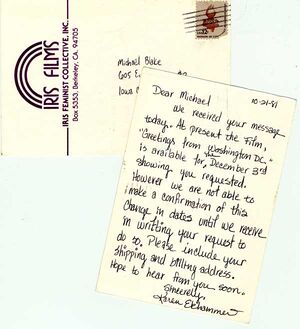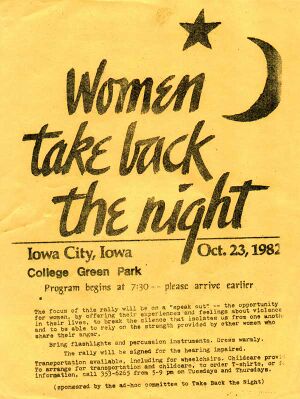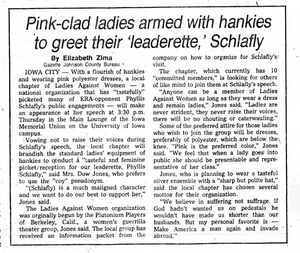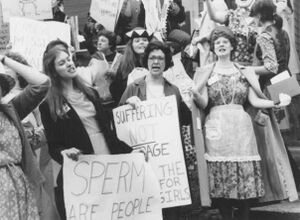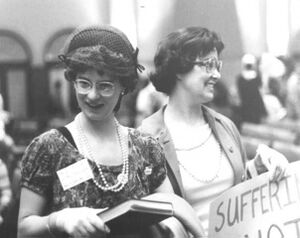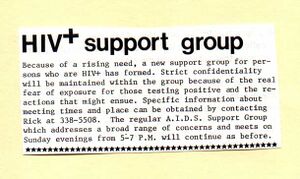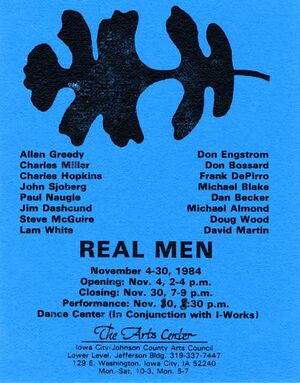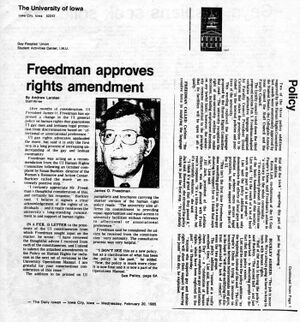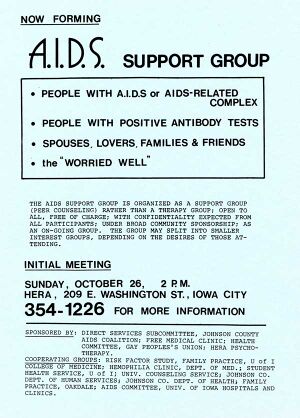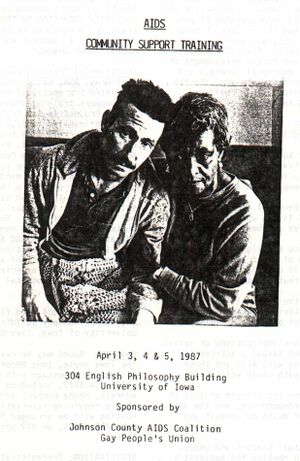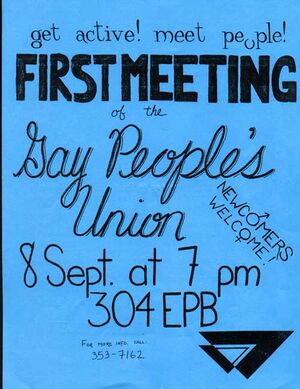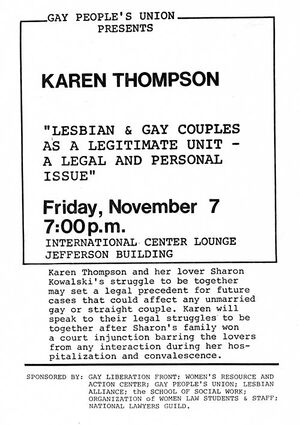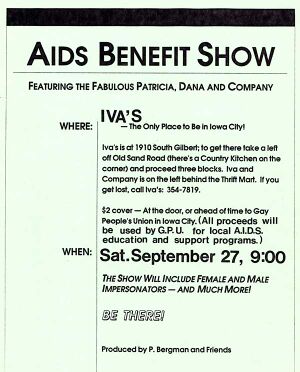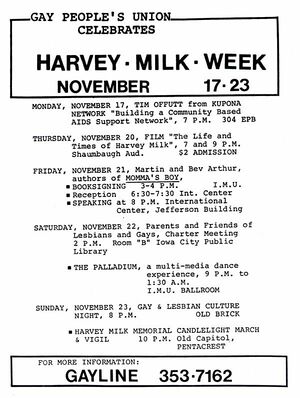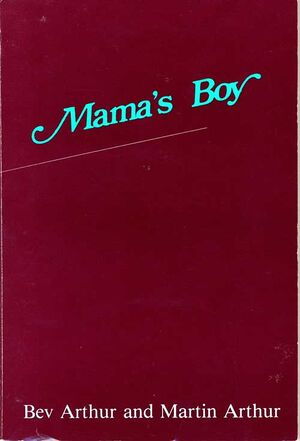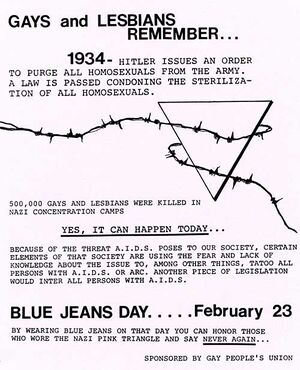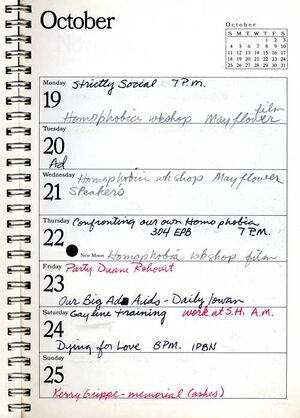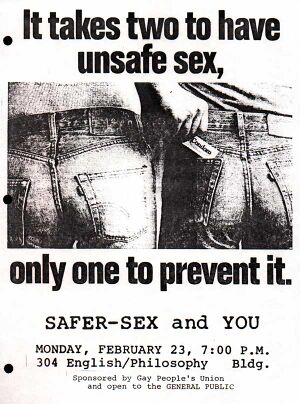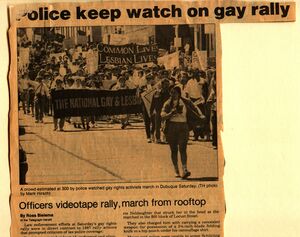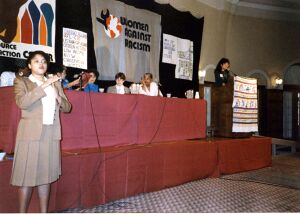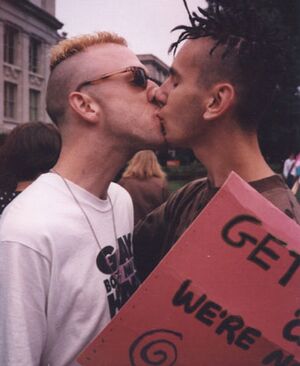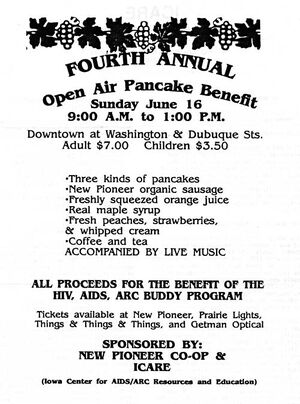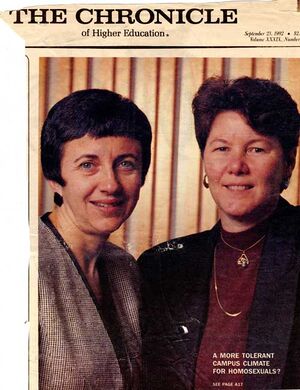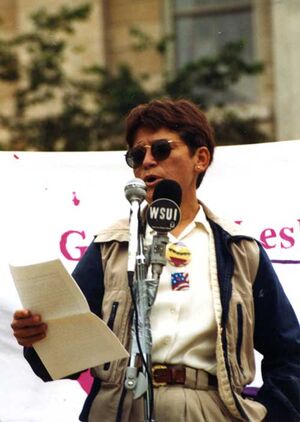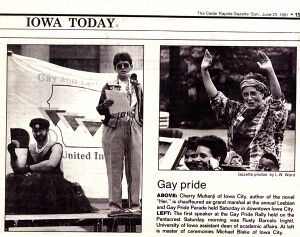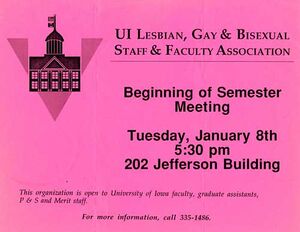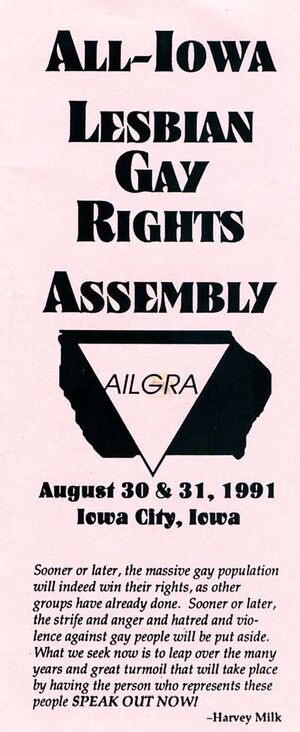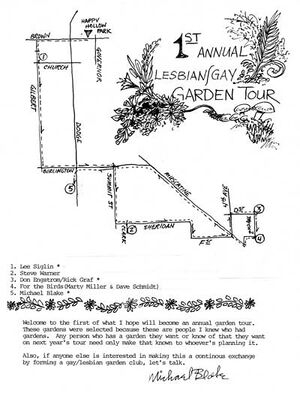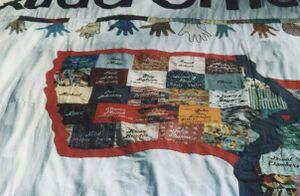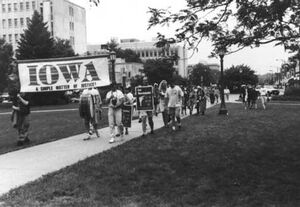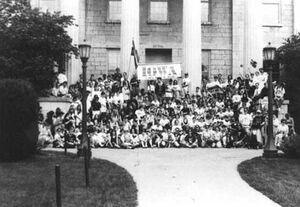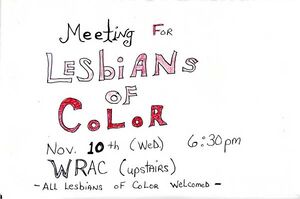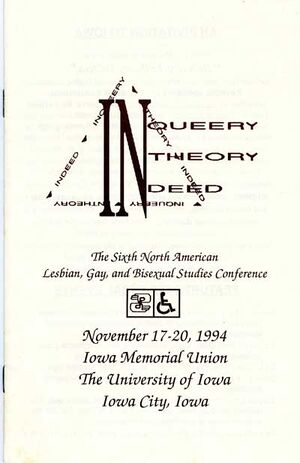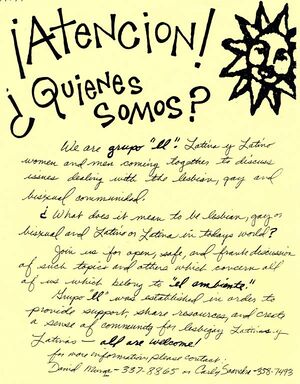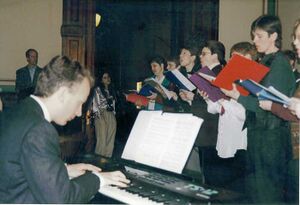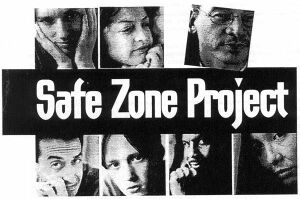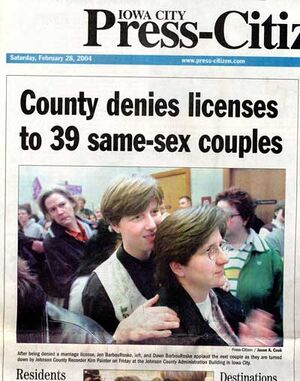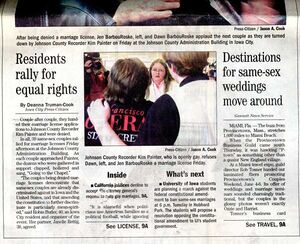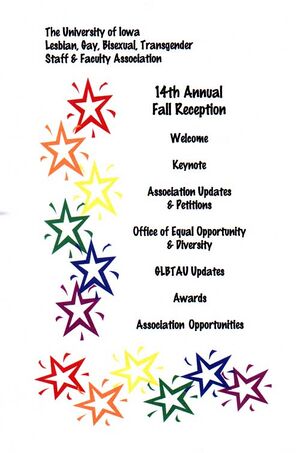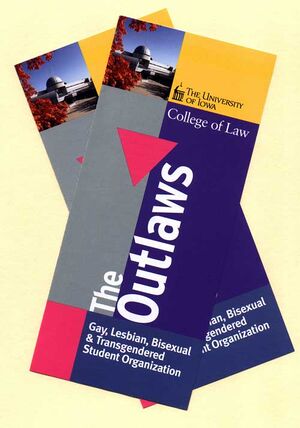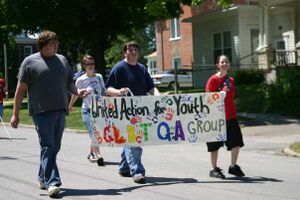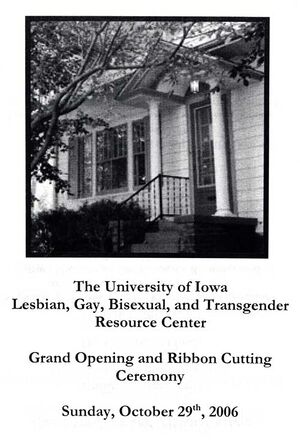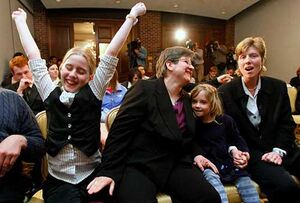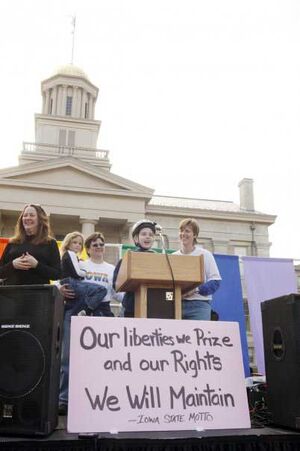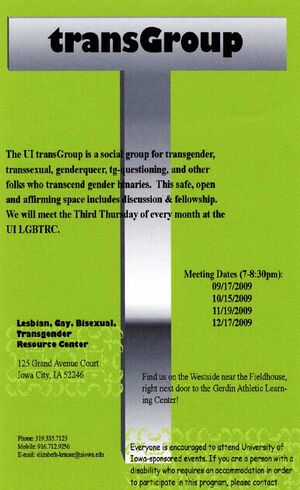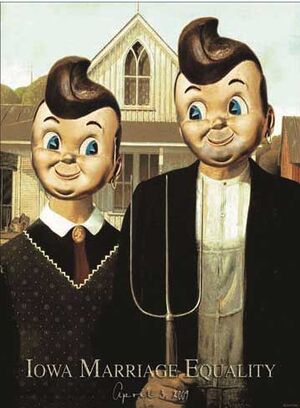LGBTQ Life in Iowa City, Iowa: 1967-2010
1967
| The Iowa Defender, an alternative newspaper, publishes a ground-breaking article, “Lesbianism in Iowa City.” |
1969
The Iowa City Women’s Liberation Front (WLF) is formed and is organized into cells and collectives according to interests such as child care, health care, gay rights, and publishing.
1970
| The publications collective of the Women’s Liberation Front begins publishing a newspaper titled Ain’t I a Woman and distributing it nationally. It deals with lesbian themes from the outset and by the time AIAW ceases publication in 1974 the collective is primarily lesbian. |
| Gay Liberation Front at the University of Iowa becomes the first gay student group in the U.S. to be officially recognized by a university. The 1971 Hawkeye yearbook includes a photograph of GLF’s entry in the 1970 UI homecoming parade. |
| On October 27, 1970, The Daily Iowan, the University of Iowa’s student newspaper, begins a five-part series on the newly-emerging gay rights movement. |
| Part two of The Daily Iowan’s series on the emerging local gay rights movement notes Gay Liberation Front’s first dance held at the campus’s Iowa Memorial Union on October 24, 1970. |
1971
| A women’s center opens in March in a Quonset hut leased from the University of Iowa; it serves as a meeting place and a clearinghouse for women’s activities on and off campus and is run as a collective. In August 1971 the University provides a house at 3 E. Market Street for the Women’s Center. In 1974 the name is changed to the Women’s Resource and Action Center to reflect its expanded goals. The Center moves to its current location at 130 N. Madison Street in 1976. |
1972
| A collective of eight women starts the Iowa City Women’s Press to print poetry and other books by women. In 1976 the Press publishes The Greasy Thumb Automechanics Manual for Women and is dedicated to lesbians everywhere: “Dykes wrote, illustrated, printed, and bound this book” to provide important knowledge for women “as they separated from men.” The Press remains in existence until 1985. |
| Promotional brochure from the Iowa City Women’s Press, ca. 1975. |
| Staff operate printing machinery at Iowa City Women’s Press, ca. 1975. |
1973
The Lesbian Alliance is formed “to meet the political, cultural and social needs of lesbians” and begins publishing Better Homes and Dykes. The organization sponsors dances, concerts, coffeehouses, workshops, softball games, and picnics as well as counseling and support groups. It meets at Wesley House early on but later works within the Women’s Resource and Action Center as the official lesbian voice for many programs: The Rape Victim Advocacy Program, the Domestic Violence Project, and Take Back the Night.
1974
| The Women’s Liberation Calendar, a project of the Iowa City Women’s Press, garners national attention. This edition was released in 1974. |
Rustic Fairy Dreams, a publication and movement for rural gay men, is founded in Grinnell, Iowa, sixty miles west of Iowa City.
1975
Gay Liberation Front changes its name to Gay People’s Union, devoting much of its energy to developing services for gays and lesbians not being provided by the University.
The Midwest Gay Pride Conference in Iowa City attracts nearly 800 and features workshops, a coffeehouse, a dance, an impromptu softball game, and a talk by Rita Mae Brown.
1976
| The Sisters of Perpetual Indulgence, a street theater group founded in Iowa City in 1976 as the Sugar Plum Fairies, finds fame and fortune after moving to San Francisco in 1979. The Sisters become a Castro legend, raising political awareness and funds to assist people with AIDs. They reunite in Iowa City in June 1987, pictured here in a Daily Iowan article. |
Grace & Rubies Restaurant, a private club and meeting place for women, opens at 209 N. Linn Street and remains in business until 1978.
In June, two men from Iowa City, Kenneth Bunch and Tracy Bjorgum, try unsuccessfully to obtain a marriage license at the Johnson County Court House.
The Iowa Legislature enacts a comprehensive criminal code revision which repeals the consensual sodomy law and establishes an age of consent of 16. The law takes effect January 1, 1978, 25 years before the U.S. Supreme Court strikes down Texas’ sodomy law as unconstitutional.
1977
Iowa City’s city council passes the state’s first anti-discrimination ordinance to include sexual preference. The law prohibits such discrimination in housing, employment, and public accommodations.
| After operating out of a suitcase for about two years, Plainswoman Bookstore opens in October at the second level of 529 S. Gilbert Street, former location of New Pioneer Coop. The building also houses Iowa City Women’s Press at this time. |
Richard MacCann, a graduate student in American Studies, teaches a course on the history and literature of homosexuality in America at the University of Iowa.
1978
| Gay Affiliates of Iowa, Iowa’s first statewide gay rights advocacy organization, is founded in Iowa City. Its first meeting is held at the Iowa Memorial Union, with its long-term goal to secure, through legislation, equal rights for gays. In 1981 the group’s name is changed to the Lesbian and Gay Affiliates of Iowa. |
1979
Following closure of Grace & Rubies, the Women’s Coffeehouse is established by the Lesbian Alliance as a social and artistic venue. Its location is kept confidential and advertising is posted only at women-oriented spaces such as the Women’s Resource and Action Center and the Plainswoman Bookstore. It operates until 1984.
A contingent from the University of Iowa Gay People’s Union joins the historic 1979 March for Lesbian and Gay Rights in Washington, D.C.
1980
A group of lesbians interested in promoting writings about their culture creates Common Lives/Lesbian Lives. The nationally-distributed publication runs from 1981 to 1996, its circulation peaking at about 2,500.
1981
| A rally to protest the screening of the movie “Cruising” – and the rise in anti-gay violence – is held in January at an Iowa City movie theater. | ||||
| “A Call to Arms” flyer in September promotes action to protect Washington, D.C.’s anti-discrimination ordinance. |
| A September rally on the Pentacrest, the University of Iowa’s central campus, protests the proposed federal Family Protection Act. |
| Women’s Halloween Dance poster. |
| A screening of the film, “Greetings from Washington, D.C.,” is scheduled in December. It is described by its producers as “a kaleidoscope of music, dance, stories and laughter shared at the first gay and lesbian rights march on Washington,” held in 1979. |
1982
The first Take Back the Night Rally in Iowa City is held in 1979 and is held annually thereafter.
1983
The Iowa City chapter of Ladies Against Women protests ERA opponent Phyllis Schlafly’s appearance at the Iowa Memorial Union on the UI campus in April.
1984
| The first reported cases of HIV/AIDS on campus galvanize Gay People’s Union to educate gay men about the disease and its prevention. The University’s Student Health Service, however, initially refuses to display AIDS information and the state’s Department of Health does not target gays in its prevention efforts. To fill this void, grassroots efforts in Iowa City begin to offer support groups and education. |
| The Arts Center of Iowa City presents “Real Men,” a performance-art exploration of the role of gender. |
1985
| University of Iowa president James Freedman in 1985 approves a campus-wide policy banning discrimination on the basis of sexual orientation. The policy, however, does not appear in the university’s policy manual until 1995 – ten years later. |
The growing number of reported AIDS cases and mounting frustration with the state’s slow response to the crisis prompt formation of the Johnson County AIDS Coalition, offering volunteer training and services to people with AIDS. Later, ICARE – the Iowa Center for AIDS Resources and Education – is founded. In addition to training sessions, AIDS support groups begin to form on campus and in the Iowa City area.
| Gay People’s Union meeting announcement, 1985. |
1986
| Gay People’s Union sponsors an appearance in Iowa City by Karen Thompson in November. Thompson fought for the right to visit her lover, Sharon Kowalski, who was seriously injured in an automobile accident in 1983. In 1991, the Minnesota Court of Appeals ruled in Thompson’s favor. | |
| Announcement of an AIDS benefit show in Iowa City in September. |
| During Harvey Milk Week in November, the Iowa City chapter of Parents and Friends of Lesbians and Gays (PFLAG) holds its first organizational meeting. | |
| Bev Arthur and her son, Martin, co-author the book “Mama’s Boy,” chronicling Martin’s coming out as a gay man. Martin, of Iowa City, had come out to his mother in a letter he wrote in 1974 while a graduate student at the University of Iowa. The title, he told the Iowa City Press-Citizen, is “a send-up of the old cliché and to grab readers’ attention.” The book, published by Strawberry Hill Press of San Francisco, garners praise from Publishers Weekly as a “refreshing narrative.” |
1987
| A flyer promotes “Blue Jeans Day” in February to honor gays and lesbians killed in Nazi concentration camps during the 1930s and 1940s. | |
| October: A week in the life of Iowa City gay activist Michael Blake includes workshops, a film, volunteer training, parties, and a memorial service. (“Mayflower” is a dormitory; “IPBN” is the Iowa Public Broadcasting Network.) |
| Safer sex workshop announcement. |
More than 100 area residents join the second March on Washington, D.C., for Lesbian and Gay Rights.
1988
| A gay rights rally in Dubuque in 1988 attracts participants from Iowa City, ninety miles away. |
On campus, Gay People’s Union becomes the Lesbian and Gay People’s Union. The following year it is renamed again, as Lesbian, Gay, and Bisexual People’s Union.
1989
The Women Against Racism Committee, formed in the early 1980s, holds a national conference in Iowa City, “Parallels and Intersections: Racism and Other Forms of Oppression.” The conference addresses a wide range of issues; lesbians play a leading role in the planning and the program.
Gays, lesbians and bisexuals protest the university’s decision to allow an anti-gay newspaper, The Campus Review, to have a display in the Iowa Memorial Union denigrating gays and promoting violence.
Celebrating pride on the Pentacrest lawn of the University of Iowa, ca. 1989.
1990
The Open Air Pancake ICARE Benefit, by now in its fourth year, becomes an Iowa City summer tradition.
1991
| Domestic partner benefits are extended to same-sex couples employed by the University of Iowa. The University of Iowa becomes the first public university in the U.S. to implement such benefits. The same year the University of Iowa’s College of Law recruits and hires an openly lesbian couple, Pat Cain and Jean Love; they are featured on the cover of a 1992 issue of the Chronicle of Higher Education. | |
| At the June pride rally, Nancy ‘Rusty’ Barceló, Ph.D., assistant dean of academic affairs, announces that she is a lesbian, becoming the University’s highest-ranking openly gay official. |
| Cherry Muhanji, author of the African American-themed novel “Her,” is grand marshal of the June gay pride parade. | ||||
| The University of Iowa LGBT Staff and Faculty Association is established. |
| A statewide lesbian and gay rights assembly is held in Iowa City. | |
| The first annual Iowa City Lesbian/Gay Garden Tour is held in June as part of Pride Month. |
1993
The Names Project, quilts honoring the memory of those who have died from AIDS, is displayed at the University’s Iowa Memorial Union.
Participants in June’s annual gay pride rally gather on the east steps of Old Capitol on the University of Iowa campus.
The Women's Resource and Action Center (WRAC) offers meeting space for lesbians of color.
1994
| The University of Iowa hosts the Sixth North American Lesbian, Gay, and Bisexual Studies Conference: “InQueery, InTheory, InDeed.” The conference showcases a wide range of queer academic and cultural initiatives. Over 1,200 attend. | |
| GRUPO LL is formed in July to provide a safe and comfortable space for Latino gays, lesbians, and bisexuals. |
1995
| The Quire, Eastern Iowa’s LGBT chorus, is founded. |
The UI student organization expands its name again. It is now the Lesbian, Gay, Bisexual, Transgender Union (LGBTU).
1996
Iowa City becomes one of the first cities in the U.S. to extend protection against discrimination based on sexual orientation and gender identity.
1998
| The University of Iowa endorses training for “safe zone” certification for campus staff and faculty. |
2000
LGBTU holds its first Rainbow Graduation ceremony in the spring.
2001
The UI student organization is renamed the Gay, Lesbian, Bisexual, Transgender and Allies Union (GLBTAU).
2004
Thirty-nine same-sex couples attempt to obtain marriage licenses in Iowa City but are turned away by Johnson County Recorder Kim Painter, an open lesbian. Painter expresses support for the applicants but cites the state’s law prohibiting her from issuing such licenses.
2005
Organizations that cater to LGBT interests and concerns serve a wide range of communities across the University of Iowa campus. Two examples are the OUTlaws, based at the UI College of Law, and the UI LGBT Staff and Faculty Association.
2006
| United Action for Youth, an Iowa City service agency, is represented in the annual pride rally in June. | |
| The UI Lesbian, Gay, Bisexual and Transgender Resource Center is dedicated on October 29. |
2007
The Iowa Legislature passes two laws of significance to the LGBT community: a statewide anti-discrimination measure, and an anti-bullying law for Iowa schools.
2009
The Iowa Supreme Court in Des Moines on April 3 unanimously – and emphatically – upholds the right of gays to marry. Iowa becomes only the third state in the U.S. – and the first in the heartland – to legalize same-sex marriage.
| Dawn BarbouRoske, second from left, of Iowa City leans towards her partner, Jen BarbouRoske, after learning of the ruling. Between them is their daughter Bre, 6. Their other daughter, 11-year-old McKinley, left, reacts to the ruling. | |
| Later that day, the BarbouRoske family joins about 200 supporters on the east lawn of the Pentacrest of the University of Iowa campus celebrating the historic ruling. |
| Meeting announcement of the UI transGroup, “for folks who transcend gender binaries.” |
The Advocate ranks Iowa City as the nation’s third-gayest city.
2010
The Iowa City Press-Citizen names Dawn and Jen BarbouRoske, a lesbian couple, as “Persons of the Year” for 2009. The BarbouRoskes were among the plaintiffs who successfully challenged Iowa’s so-called defense of marriage law, resulting in the landmark 2009 Iowa Supreme Court ruling.
REFERENCES
At the Center: Celebrating Thirty Years of Activism and Communities. Women’s Resource and Action Center, 2002.
Blake, Michael. “Gay, Lesbian, Bisexual Activity at the University of Iowa: An Overview.” Typescript [1995].
Yanney, Linda. “The Practical Revolution: An Oral History of the Iowa City Feminist Community, 1965-1975. ” PhD dissertation, University of Iowa, 1991.
Iowa Women’s Archives: Collections Pertaining to Lesbian, Gay, Bisexual and Transgender Persons and LGBT Issues: http://www.lib.uiowa.edu/iwa/Topical_holdings_lists/LGBT.html
University of Iowa Archives: Records of the Gay, Lesbian, Bisexual, Transgender and Allies Union: http://www.lib.uiowa.edu/spec-coll/archives/guides/RG02/RG02.03.18.htm
University of Iowa Archives: Records of the UI Lesbian, Gay, Bisexual, and Transgender Staff and Faculty Association
University of Iowa Archives: Subject Vertical Files Collection
University of Iowa Archives: Organizations and Clubs Vertical Files Collection <comments />

